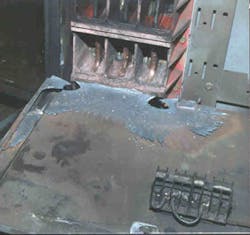The plaintiff's attorney retained me to investigate the cause of the accident and uncover what had initiated the arcing and burn down. Clearly, some conducting material had made contact between the metal of the cabinet and the 480V bus bars. A burned screwdriver found at the scene was a likely candidate. Inspection revealed that the gap between the upturned rear edge of the horizontal separator pans and the vertical rear panel of the plug in motor control units varied from 1/16 in. to ½ in. Thus, it appeared that this gap wasn't a parameter subject to quality control in the manufacturing process.
Just before the accident, the electrician had been sitting on a stool with the cabinet door open. He began to cut the wires, strip the insulation, and connect control power to the connector strip on the horizontal separator pan. He may have laid down the screwdriver on the pan while cutting and stripping the next wire. When he reached for the screwdriver, it rolled to the rear of the cabinet, and the shank and blade passed through the gap and made contact with one of the phase bus bars, thus creating a line-to-ground fault. The initial arcing ionized the air, causing the fault to propagate to the other two phases.
While taking the electrician's deposition, the defendant's attorney encouraged him to agree that he should have turned off the breaker supplying power to the MCC before beginning his work. The electrician refused to agree, stating that the MCC was supplying power to active loads in the shopping center, which he couldn't take offline during business hours. The attorney quickly came back with an alternate recommendation: Shouldn't the electrician have scheduled the work at night to ensure safety and prevent any kind of business interruption? The electrician held his ground, stating that no voltage was present inside the motor control unit where he was working because the unit was turned off and the stab connection to the bus bars was retracted.
Since I'd already read the electrician's testimony before the defendant's attorney took my deposition, I was expecting the same line of questioning. I was not disappointed. I strongly supported the electrician's position. In particular, the equipment had design features to ensure the control module doors couldn't be opened unless the module's power was turned off. The device's design incorporated interlocks to prevent turning the module on with the door open. A page in the product description, titled “The latest advance in operator protection,” states: “The advance/retract mechanism used on all plug-on units reaches a new level of operator protection and offers important operational features never before available in motor control center construction.”
Several pages of my deposition were devoted to questions and answers regarding the optional bus closing plugs (Photo 3). I testified that given the variability in the gaps between the horizontal pan and the rear cover of the plug-in modules, these bus closing plugs should be mandatory. The warning message on the face of the bus closing plugs suggested that the design engineers didn't consider these plugs to be optional. The message reads:
“DANGER: REMOVAL EXPOSES LIVE PARTS; REMOVE ONLY TO INSTALL UNIT.”
If these plugs had been in place in this particular MCC, this accident would never have occurred.
My testimony coupled with that of the electrician/plaintiff helped settle the case two weeks later. The terms were quite satisfactory to the plaintiff.
When should you de-energize a motor control center for maintenance? The power supplying an MCC must be turned off if there is any possibility you might come in contact with the internal bus bars. If the bus bars are adequately protected by bus closing plugs or other equivalent means, then it's safe to work inside the individual motor starters or other control apparatus that may be plugged into the MCC.
Rummer is an engineering consultant and expert witness in courts throughout the central United States.
